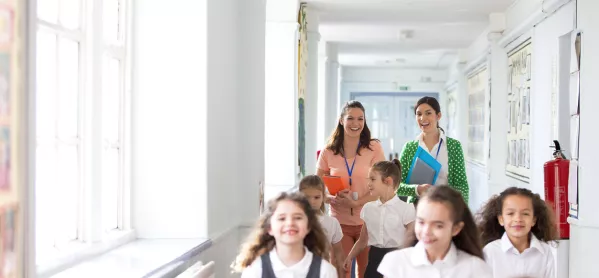Retain social distancing to keep schools open, says WHO

Schools across Europe should continue to use social distancing to minimise the spread of Covid-19, global health leaders have said.
The World Health Organisation (WHO) has said that it is of “paramount importance” that “classroom-based learning continues uninterrupted” across the European region, where the highly transmissible Delta variant remains dominant.
In order to achieve this, schools should put in place measures to “minimise the risk of Covid-19 and the spread of different variants” - including “smaller class sizes where possible” and “physical distancing”, the WHO said yesterday.
NEU: Schools ‘could keep masks and social distancing’
Williamson: Parents must make sure pupils are tested
Background: School bubbles ‘to be scrapped from 19 July’
Some of the measures recommended by the WHO have already been taken, or are due to be taken, in England - such as vaccinating vulnerable children aged 12 and over and regularly testing pupils and staff.
The organisation also called for “better classroom ventilation”, which the Department for Education has aimed to achieve by distributing 300,000 carbon-dioxide monitors to state schools across England.
The devices will enable teachers to identify where ventilation needs improvement and to “act quickly” where it is found to be poor, the department said.
But the DfE put an end to social distancing in schools as the summer term drew to a close - scrapping “bubbles”, which were used to keep groups of children apart.
The NEU teaching union has previously said secondary school leaders will want to consider keeping social distancing where possible when students return to the classroom in the autumn term.
But Mary Bousted, NEU joint-general secretary, told Tes that the government is unlikely to endorse this.
“They should be doing that but they won’t,” she said.
“I think members really want to go back to school; they’re looking forward to it but I think members wish their safety was taken more seriously.
“It seems to us the government is relying on one mitigation, which is lateral flow tests. They’ve given up on social distancing, they’ve given up on smaller class sizes, they’ve given up on ventilation, really, and they’ve abandoned mask-wearing, which is an important mitigation, so I think that members want to go back - they don’t want to go back to remote learning. We all want schools to be open and to remain open but it feels like the government wishes it but isn’t having the means to make it happen.”
Geoff Barton, general secretary of the Association of School and College Leaders, also said the government “long ago abandoned any real notion of social distancing in schools and colleges”.
“The intrinsic problem is that it simply isn’t possible to implement meaningful social distancing in spaces which are, by their nature, busy and crowded,” he said.
“The raft of control measures introduced last academic year were intended to reduce the risk of transmission largely without the need for social distancing, but the government has now decided to remove most of these measures, too.
“This does leave us in a potentially challenging position in the autumn term, if the incidence of coronavirus cases is high, and the government will need to keep the situation under review and provide more support to schools and colleges if this is needed.”
Current government guidance states that the DfE “no longer“ recommends that it is necessary to keep children in “consistent groups“.
“As well as enabling flexibility in curriculum delivery, this means that assemblies can resume, and you no longer need to make alternative arrangements to avoid mixing at lunch,” it says.
However, schools have been told to ensure their contingency plans “cover the possibility that, in some local areas, it may become necessary to reintroduce ‘bubbles’ for a temporary period, to reduce mixing between groups”.
“Any decision to recommend the reintroduction of bubbles would not be taken lightly and would need to take account of the detrimental impact they can have on the delivery of education,” the guidance adds.
In a joint statement with Unicef, issued yesterday, the WHO said: “As millions of children return to school across the European region, where the highly transmissible Covid-19 Delta variant is dominant, the WHO Regional Office for Europe and the United Nations Children’s Fund (Unicef) Europe and Central Asia Regional Office call for schools to stay open and be made safer by adopting measures to minimise transmission of the virus.
“These measures include offering teachers and other school staff the Covid-19 vaccine as part of target population groups in national vaccination plans, while ensuring vaccination of vulnerable populations.
“In addition, children aged 12 years and above, who have underlying medical conditions that put them at greater risk of severe Covid-19 disease, must be vaccinated.
“Making improvements to the school environment through better classroom ventilation, smaller class sizes where possible, physical distancing and regular testing of children and staff, are other important actions.”
A DfE spokesperson said: “Education remains a national priority, and the success of the vaccine programme means schools and colleges will deliver high-quality, face-to-face education to their pupils, with minimal disruption.
“That is why the measures in place strike the right balance between making schools safe - with enhanced ventilation, Covid testing and vaccinations of older students and staff - and reducing disruption by removing bubbles and face coverings.”
You need a Tes subscription to read this article
Subscribe now to read this article and get other subscriber-only content:
- Unlimited access to all Tes magazine content
- Exclusive subscriber-only stories
- Award-winning email newsletters
Already a subscriber? Log in
You need a subscription to read this article
Subscribe now to read this article and get other subscriber-only content, including:
- Unlimited access to all Tes magazine content
- Exclusive subscriber-only stories
- Award-winning email newsletters
topics in this article



